Cleaning a cat’s litter box can be an unappealing yet necessary task for cat owners. It often leaves cat lovers wondering about their furry friend’s perspective on this unglamorous process. Cats are fascinating creatures, and their behavior surrounding elimination reflects their instincts and psychology. To gain some clarity on this everyday chore, let’s dive deeper into why our feline companions behave the way they do regarding their litter box habits.
Cats have an intrinsic urge to bury their waste. In the wild, they employ this behavior not solely for neatness but primarily for survival. Predator dynamics dictate that dominant cats may leave their droppings exposed to assert their territory, while more submissive cats bury theirs to avoid confrontation or predation. This behavioral instinct is still prevalent in domesticated cats, even when removed from the dangers of the wild. When you tend to their litter box—removing the very evidence of their presence and instinctive behaviors—it can be perplexing for them.
When cats sense a clean litter box, they may view it as an invitation to refresh their scent marking. Their territorial instincts can kick in, prompting them to mark the area again. This seemingly odd behavior is rooted in their ancestral habits and demonstrates their connection to their primal nature.
The placement and routine surrounding a litter box are paramount to a cat’s comfort and willingness to use it. Sudden changes in the location of a litter box can confuse your feline friend. A cat’s instinctual behavior is tied to familiarity and consistency; moving the litter box, even slightly, can disrupt their routine and prompt them to avoid it altogether. Experts recommend gradual relocation—shifting the box a couple of inches each day—to establish a new habitual location without alarming the cat.
Moreover, a suitable location is crucial. Cats prefer quiet, private areas that provide them comfort while they relieve themselves. A busy environment or high traffic area may deter them from using their litter box effectively. As cat owners, we must respect our pets’ preferences for privacy, creating a serene space that caters to their instincts.
Daily Maintenance for Health and Happiness
Cats are notoriously clean animals. Regular maintenance of their litter box is essential for both their health and emotional wellbeing. Neglecting to scoop the box daily can lead to reluctance in using it, as cats typically prefer eliminating in clean spaces. If the litter box becomes too soiled, a cat might opt for a spot just outside, not as a form of revenge, but simply due to their instinctive need for cleanliness.
For households with multiple cats, the number of litter boxes should ideally equal the number of cats plus one. A shortage can lead to territorial disputes or avoidance behaviors. Daily cleaning not only promotes a hygienic living environment but also reduces potential allergens and odors for both the cat and its human companions.
Transitioning to New Litter and the Risk of Aversion
Switching cat litter should be done with care. A sudden introduction of a new type may provoke confusion or reluctance in your cat. To ensure a smooth transition, consider gradually mixing the new litter with the old, slowly increasing the proportion of the new litter over a few days or weeks. This gentle acclimation prevents discomfort and helps your cat adjust, minimizing the risk of accidents around the house.
Failure to integrate changes considerately may result in your cat developing an aversion to litter box usage altogether. As owners, we must be attentive to these subtleties to ensure our pets remain happy and healthy.
In essence, cleaning your cat’s litter box is more than just a mundane chore; it’s a window into their world filled with instincts, preferences, and innate behaviors. By understanding the significance of their actions, we can foster a more comfortable environment that meets their needs. The next time you find yourself scooping litter, consider the silent questions your cat might have. They might just wish for a little more understanding of why you’re taking such an active role in their natural habits. Ultimately, building a harmonious relationship with our feline companions involves recognizing and respecting their instincts while ensuring their home remains clean and secure.


Leave a Reply